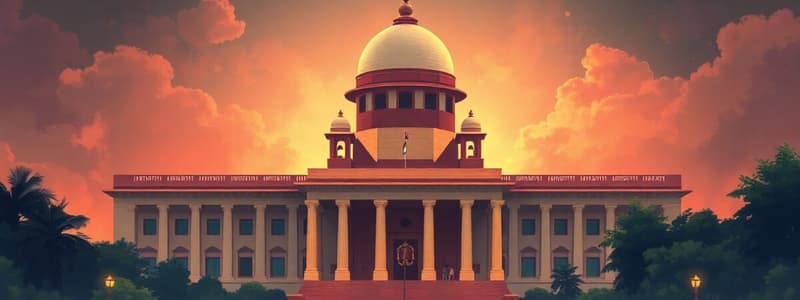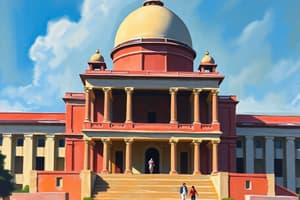Podcast
Questions and Answers
What is the highest court of appeal in India?
What is the highest court of appeal in India?
- High Court
- Subordinate Court
- Supreme Court (correct)
- District Court
What is a requirement for someone to become a judge of the Supreme Court?
What is a requirement for someone to become a judge of the Supreme Court?
- Must have served as a judge in the District Court
- Must be a citizen of India (correct)
- Must have a law degree from an international university
- Must be a lawyer for at least 15 years
Which statement correctly describes the composition of the Supreme Court?
Which statement correctly describes the composition of the Supreme Court?
- It consists of the Chief Justice and an unlimited number of judges
- It consists of the Chief Justice and a maximum of 20 judges
- It consists of only 10 judges
- It consists of the Chief Justice and not more than 25 judges (correct)
At what age does a judge of the Supreme Court retire?
At what age does a judge of the Supreme Court retire?
Which of the following powers is NOT a function of the Supreme Court?
Which of the following powers is NOT a function of the Supreme Court?
Who is responsible for appointing judges to the Supreme Court?
Who is responsible for appointing judges to the Supreme Court?
Which one of the following is NOT a criterion to qualify as a judge of the Supreme Court?
Which one of the following is NOT a criterion to qualify as a judge of the Supreme Court?
Under what circumstance can a judge of the Supreme Court be removed?
Under what circumstance can a judge of the Supreme Court be removed?
What is the focus of the original jurisdiction of the Supreme Court?
What is the focus of the original jurisdiction of the Supreme Court?
In which scenario can an appeal be made to the Supreme Court concerning civil cases?
In which scenario can an appeal be made to the Supreme Court concerning civil cases?
What characterizes the advisory jurisdiction of the Supreme Court?
What characterizes the advisory jurisdiction of the Supreme Court?
What does the Supreme Court’s role as a court of record entail?
What does the Supreme Court’s role as a court of record entail?
Which of the following writs can the Supreme Court issue to protect Fundamental Rights?
Which of the following writs can the Supreme Court issue to protect Fundamental Rights?
What constitutes contempt of court as per the powers of the Supreme Court?
What constitutes contempt of court as per the powers of the Supreme Court?
Under what conditions can the Supreme Court review a judgment it has made?
Under what conditions can the Supreme Court review a judgment it has made?
What is required for a crime to be appealed in the Supreme Court?
What is required for a crime to be appealed in the Supreme Court?
What power does the High Court have concerning cases in Subordinate Courts involving substantial questions of law?
What power does the High Court have concerning cases in Subordinate Courts involving substantial questions of law?
Why is the High Court designated as a Court of Record?
Why is the High Court designated as a Court of Record?
What is the highest court in a district?
What is the highest court in a district?
What is the purpose of Gram Nyayalayas?
What is the purpose of Gram Nyayalayas?
Which of the following is NOT a power of the High Court regarding judgments from lower courts?
Which of the following is NOT a power of the High Court regarding judgments from lower courts?
Which statement about Lok Adalats is accurate?
Which statement about Lok Adalats is accurate?
What type of cases do Gram Nyayalayas handle?
What type of cases do Gram Nyayalayas handle?
Which of the following best describes the role of Subordinate Courts?
Which of the following best describes the role of Subordinate Courts?
What does original jurisdiction of the High Court refer to?
What does original jurisdiction of the High Court refer to?
In which case can an appeal be filed against a Sessions Judge's decision?
In which case can an appeal be filed against a Sessions Judge's decision?
Which jurisdiction allows the High Court to supervise lower courts and tribunals?
Which jurisdiction allows the High Court to supervise lower courts and tribunals?
Who has the authority to appoint officers and staff of the High Court?
Who has the authority to appoint officers and staff of the High Court?
What happens to capital punishment given by a Sessions Judge?
What happens to capital punishment given by a Sessions Judge?
Under Article 229, who controls the administrative expenses of the High Court?
Under Article 229, who controls the administrative expenses of the High Court?
Which jurisdiction enables the High Court to call for returns from lower courts?
Which jurisdiction enables the High Court to call for returns from lower courts?
What is a limitation of the High Court's supervisory jurisdiction?
What is a limitation of the High Court's supervisory jurisdiction?
What is one primary role of the Supreme Court of India?
What is one primary role of the Supreme Court of India?
What power does the Supreme Court possess concerning laws passed by Parliament?
What power does the Supreme Court possess concerning laws passed by Parliament?
Who appoints the judges of a High Court in India?
Who appoints the judges of a High Court in India?
What is the minimum requirement for a person to be appointed as a High Court judge?
What is the minimum requirement for a person to be appointed as a High Court judge?
At what age does a judge of a High Court retire?
At what age does a judge of a High Court retire?
What grounds can the President use to remove a High Court judge?
What grounds can the President use to remove a High Court judge?
Which of the following best describes Public Interest Litigation (PIL)?
Which of the following best describes Public Interest Litigation (PIL)?
Which of the following statements about the composition of the High Court is correct?
Which of the following statements about the composition of the High Court is correct?
Flashcards are hidden until you start studying
Study Notes
The Judiciary
- The Indian judiciary comprises the Supreme Court, High Courts, and Subordinate Courts.
- The Supreme Court is the highest court of appeal, the High Court acts as the intermediary, and the Subordinate Courts are the lowest level.
Supreme Court
- The Supreme Court is composed of the Chief Justice of India and a maximum of 25 other judges.
- The President of India appoints all Supreme Court justices, consulting with the Chief Justice of India and other judges as deemed necessary.
- To be a Supreme Court Justice, an individual must be a citizen of India, have served as a High Court judge for at least five years, or have been an advocate of a High Court for at least ten years.
- Supreme Court Justices retire at age 65 but can resign earlier.
- They can be removed from office only through impeachment proceedings based on "proved misbehaviour" or "incapacity."
Supreme Court Jurisdiction
- Original Jurisdiction: The Supreme Court directly hears disputes between the Central Government and state governments, or between states.
- Appellate Jurisdiction: The Supreme Court hears appeals on constitutional interpretations, civil cases, and criminal cases.
- Advisory Jurisdiction: The President can seek the Supreme Court's opinion on legal or factual matters related to the Constitution, but the Court's opinion isn't legally binding.
- Court of Record: Supreme Court decisions have significant evidentiary value and serve as precedents for future cases.
- Writs: The Supreme Court can issue writs like habeas corpus, mandamus, prohibition, quo warranto, and certiorari to protect fundamental rights.
- Contempt of Court: The Court punishes individuals for disrespect or defiance of its authority.
- Review of Judgments: The Supreme Court can review its past decisions if new evidence arises or errors are identified.
- Guardian of the Constitution: The Supreme Court is the final interpreter of the Constitution.
- Judicial Review: The Court determines the constitutionality of laws passed by Parliament or state legislatures and executive decisions.
- Public Interest Litigation (PIL): Citizens can file lawsuits on behalf of the public interest even without direct involvement in the case.
The High Court
- Each Indian state has a designated High Court, with some Courts serving multiple states.
- The High Court consists of a Chief Justice and other judges.
- The President appoints High Court judges after consulting with the Chief Justice of India and the state's Governor.
- High Court judges have similar qualifications and tenure as Supreme Court justices.
- They can also be removed by the President in similar circumstances.
High Court Jurisdiction
- Original Jurisdiction: The High Court directly hears certain cases.
- Appellate Jurisdiction: The High Court hears appeals from lower courts in both civil and criminal cases.
- Supervisory Jurisdiction: The High Court oversees the functioning of lower courts and tribunals within its state.
- Administrative Jurisdiction: The High Court manages its own administrative affairs, including staffing.
- Transfer Cases from Subordinate Courts: The High Court can transfer cases involving constitutional issues to itself, ensuring consistency in interpretation.
- Court of Record: High Court decisions are binding on lower courts within the state.
- Miscellaneous Powers: The High Court can examine lower court decisions and punish contempt of court.
Subordinate Courts
- These courts are located at the district level and supervised by the High Court
- They include various levels like District Courts, Courts of Assistant Judges, Sub-Judges, and Munsifs.
Panchayat Courts (Gram Nyayalayas)
- The Gram Nyayalayas Act, 2008, established Village Courts, one for each intermediate-level panchayat (local government) or group of contiguous panchayats.
- Their aim is to provide affordable justice to rural communities.
- They have jurisdiction over both civil and criminal cases, but with some modifications.
Lok Adalats
- Lok Adalats are people's courts that settle disputes through mediation and compromises.
Studying That Suits You
Use AI to generate personalized quizzes and flashcards to suit your learning preferences.




